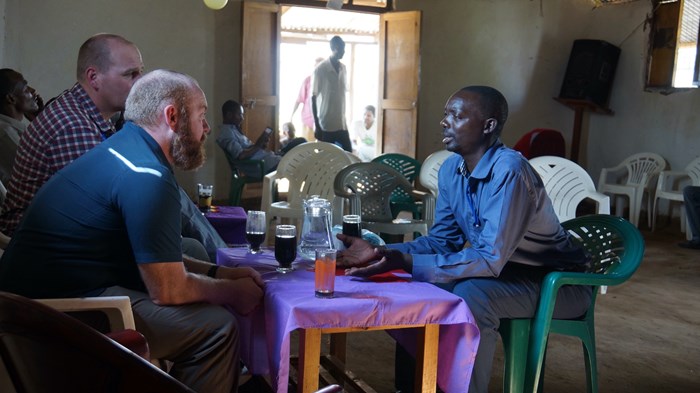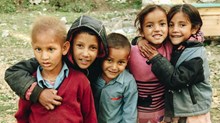Here's Why Refugee Ministry Is Not Missions as Usual

War, persecution, and gross violations of human rights have forced nearly 80 million people from their homes – 30 million of whom are seeking refuge in a foreign land (i.e. refugees and asylum seekers). These are women, men and children who have been stripped of place in the world and with it of their dignity and humanity as well. Their numbers continue to rise even as the causes of their displacement grow increasingly protracted.
In the midst of this harsh reality there is some encouragement to be found. There is a growing global movement of the Holy Spirit among churches to include forcibly displaced people within the scope of their mission. But serving people experiencing humanitarian crisis is not missions as usual.
Refugees and asylum seekers have been stripped of their belongings, community, and place in the world. Their past is tainted with suffering and loss. Their present is marked by dependency on humanitarian agencies or social services. Their future is uncertain. Their freedom of movement is often restricted as is their access to employment. Their permission to remain in their country of refuge is not guaranteed. They cannot return to their country of origin without risking prison or death. Even access to them from people on the outside is often restricted. They hear media and politicians often portray them as a burden or even as a threat to society. Still, they dream of one day having a normal life again.
So, as we set out to care for them in Jesus’ name, I’d like to suggest four starting points to help assure that our engagement with refugees is truly life-giving.
First, recognize the special role that a healthy local church can play in the lives of refugees and asylum seekers.
When at her best, a local church is far more than a worship and lecture hall. She is a welcoming and healing community of hope. These are the core contributions churches have to offer our displaced friends as they long to find welcome, belonging, friendships, hope, and healing in their new context.
While this certainly applies to individuals who find refuge in our neighborhoods, it also applies to ethnic and religious communities that are made up of forcibly displaced people. Churches can reach out to them and welcome them and let them know of our desire to help them find belonging and integration in our shared society. Such welcome, inclusion and recognition of belonging goes a long way toward healing and restoration of hope.
Second, recognize refugees as an important part of the solution to the many challenges they face.
I fear that many of us start out on the wrong foot when we launch out into refugee ministry. We see the challenges and needs confronting asylum seekers and refugees and proceed to treat them as if they were only people in need. We fail to recognize them as part of the solution to their struggles. We fail to recognize them as having a meaningful contribution to offer society. We fail to see them as having something valuable to offer us. The result is that our ministries are often one-sided affairs, with ourselves as the givers and refugees as the takers. In doing so, we may find ourselves further dehumanizing them even as we seek to love them.
We need to recognize asylum seekers and refugees as more than “people in need”. We will do well to view them as valued partners. We will love them best when we affirm their dignity by listening to them name their challenges and share their ideas and solutions to overcome them. We demonstrate respect and affirm their worth when we invite their feedback concerning our ideas and plans related to serving them. Such a posture goes a long way toward rehumanizing people who have experienced all sorts of dehumanization in life. Ministry looks quite different when we choose to minister with them rather than to them.
Third, hospitality should come before programs and services.
There is no better starting point for Church engagement with refugees and asylum seekers than inviting and welcoming them into our homes and visiting them in theirs. They are likely to invite us into their space first as hospitality often comes more naturally to our displaced friends than it does to many of us. We will do well to embrace their invitation as a precious gift and step into their world.
We might prefer the comfort, distance, and control of programmed ministries like distributing clothing and food to the intimacy of sharing a table. It might feel vulnerable inviting strangers into our homes and going to visit them in theirs. For many of us, this will take us out of our comfort zone. But this is what we need. It is around tables that we will discover and affirm each other’s humanity. If Christians are not willing to share their tables with marginalized strangers in our society, who will?
Fourth, we must be truly safe.
Before we take a step toward our displaced friends, we need to check our motivation and be certain that we are not harboring ulterior motives. We need to be faith communities that welcome and respect people just as they are – without a predetermined agenda to change them to become or even believe like us. It is then that we best reflect the image of Jesus.
Our faith in Jesus will still shine through our lives. If our displaced friends should entrust us with their pain, struggle, and brokenness, it is fitting to share that God sees, hears, and cares for them and to offer to pray with them. The key is that we do so because we care for them and not because we are trying to change them. Let us be content in loving them and trust God to be present and revealing himself as we do so.
As true friendships are marked by mutual vulnerability, we need to be at least as open and vulnerable with our displaced friends as they are with us. As we expose our hopes, fears, and pains to them, we will often find understanding and receive comfort ourselves. And it is often in our humility and weaknesses that God is most glorified.
May many refugees and asylum seekers find the welcome, healing and hope they so desperately need in our communities of faith.
-----
Some resources for further reflection:
The Better Samaritan is a part of CT's
Blog Forum. Support the work of CT.
Subscribe and get one year free.
The views of the blogger do not necessarily reflect those of Christianity Today.






















